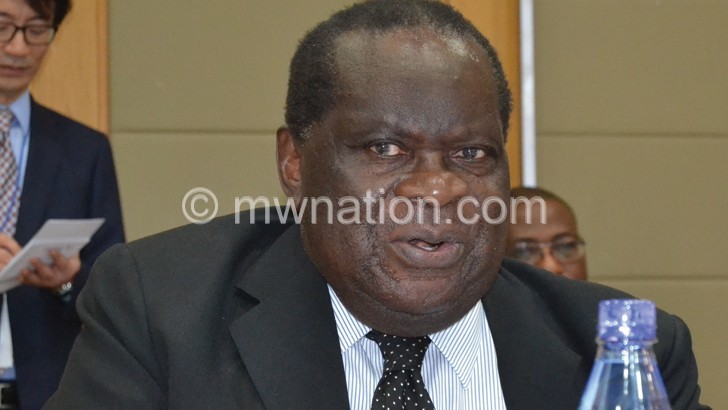Malawi gives up on K60bn from World Bank

Cabinet has not met to discuss proposed reforms to Agricultural Development and Marketing Corporation (Admarc), one of the conditions the World Bank has set for the country to get a K60 billion budgetary support in 2018/19 financial year.
Minister of Finance, Economic Planning and Development Goodall Gondwe has confirmed that the discussion on Admarc reforms will be undertaken by the government that will be formed after the May 21 2019 Tripartite Elections.
Initially, the minister told the media that there was still a chance that the funding could be disbursed upon meeting the necessary conditions which the World Bank set.
Grants in the 2018/19 Budget totalled K209 billion of the K1.4 trillion budget, including the K60 billion as a programme grant, K62 billion in dedicated grants and K86 billion in project grants.
This development puts a dent in the 2018/19 Budget which is unlikely to be filled by tax revenues whose performance has not been consistent in the latter part of the first half.
Without the K60 billion, it means that Gondwe has to effect expenditure cuts during the Mid-Year Budget Review.
In education, government might not be able to fulfill the budgetary plan to provide desks for primary and community day secondary schools at a cost of K5 billion and the programme to construct 100 girls hostels to the tune of K5 billion might encounter hiccups.
With K60 billion not coming in, there is also little assurance that the drug budget pegged at K22 billion—of which K14 billion was for district hospitals—would be fully allocated this financial year.
Without the K60 billion, government has missed out on a chance to allocate K100 million towards the construction of girls’ hostels at Mpemba and Chilwa juvenile reformatory centres.
After allocating K800 million towards construction of Blantyre District Hospital last financial year then nothing this year, a fraction of the K60 billion would have gone a long way in making the project a reality.
The budgetary support could have gone a long way in reducing the domestic debt which is reaching unmanageable levels.
It would not be the first time that the government has used budgetary support to repay domestic borrowing and the huge arrears that have been accumulated while the government deals with every increasing budget deficits.
In 2017/18, Gondwe announced plans to use $80 million from the World Bank towards reducing domestic debt instead of paying interests on the same.
As of June, 2018, public debt amounted to K2.9 trillion, of which K1.5 trillion was domestic debt comprising 62.2 percent in treasury notes, 32.8 percent in treasury bills, 4.4 percent in zero-coupon notes then advances from commercial banks and promissory notes.
In 2017/18, Treasury used K80 billion from the World Bank to pay off domestic debt which provided it with temporary relief and room to implement the budget without the impediment of massive debt hanging over the government.
With the scrapping of the K60 billion and the other grants likely to perform badly this being an election year, the Budget and Finance Committee chairperson Rhino Chiphiko foresees a drastic revision of the budget.
When asked the reasons for not meeting, Gondwe said he has “not been strong about it” but conceded it was a process that would take longer than the four months left before the elections.
“It is a politically sensitive issue, we cannot do it just like that. It will have to be a matter for the next government to look into. We have done the paper work which we can leave behind but if it’s still ourselves then even better,” he said.
He said the government recognises that Admarc is the umbilical cord of food security in the rural areas and any changes should be looked at critically.
The World Bank recommends that statutory corporations such as Admarc should not get bailouts like the K45 billion the grain trader got last financial year which made affected budget performance.
Bailouts as a result of government guaranteed loans forces Treasury to borrow to cover the fiscal deficit, thereby further increasing its indebtedness.
Gondwe conceded that mixing the two Admarc functions as it is happening now has not worked out as evidenced by the K45 billion bailout in 2017/18.
The Finance minister defended the bailout attributing it to poor projections on maize availability for purchase which prompted Admarc to buy maize using loans from commercial banks at high interest rates that could not be disposed of in the end.
Reacting to the development, Economics Association of Malawi (Ecama) president Chiku Kalilombe urged the government to pursue the World Bank budgetary support for next financial year.
The 2018/19 Budget is already reeling from a K54.5 billion deficit as of November and this is likely to go up to mid-term owing to low grants disbursements from institutions such as World Bank.
The government is clearly spending more than it is collecting to support the budget and this could result in cuts in the budget when Parliament meets next month.
“It’s a hard thing to do in an election year as we are unsure whether the government will stick to this,” Kalilombe said.
On Admarc, Chiphiko said as it stands now, the government is running Admarc and would not have the resources to turn it into a commercial entity.
While he could not indicate which areas Treasury should revise, Chiphiko said what was certain was the downward revision of expenditure lines and stop counting on grants.
On its part, Peoples’ Party (PP) believes the government fears that its decision on Admarc might be unpopular and cost it votes; hence, postponing a decision on it.
PP spokesperson Ackson Kalaile-Banda alleged that Admarc is a cash-cow of the ruling party and the party fears that a decision on its future would expose their corrupt dealings.
Institutions such as World Bank and African Development Bank have since cautioned against pre-election spending as one way of lowering the deficit and maintaining expenditure within approved ceilings.





